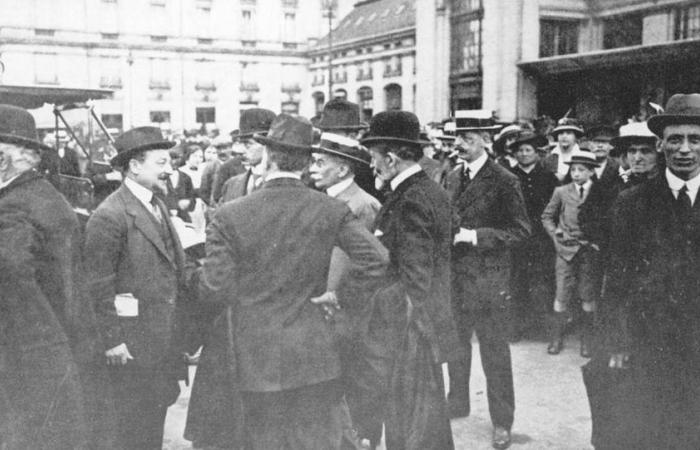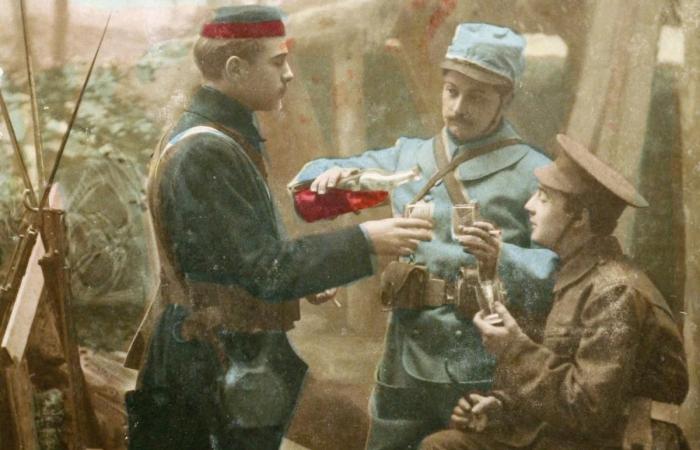“Monsieur Poincaré and the government in Bordeaux”: the headline made the front page of the evening edition of “La Petite Gironde”, on September 4. For the second time in its history after 1870, Bordeaux became the temporary capital of France, before being so again in 1940.
World history will be written in Bordeaux.
Despite the soothing news distilled by the newspaper, in the north, it is a disaster. The Germans force the French and British to withdraw and threaten Paris and the Republic: a counter-offensive must be organized. “It is essential that the government remains free to act,” justifies the president, Raymond Poincaré. World history will therefore be written in Bordeaux.
The victory of the first battle of the Marne is organized from Bordeaux
Gloomy, the rumor of exile had been circulating since August 29. On September 3 at 11:59 a.m., the President of the Republic, his wife and his ministers arrived at Saint-Jean station aboard a special train. On the quay, officials including Olivier Bascou, the Prefect, a few curious onlookers and the newspaper covering the event. Poincaré and Madame drive up the Cours Saint-Jean (today Cours de la Marne), and reach the Prefecture, rue Vital-Carles, to the cheers of the crowd. The surroundings of the new Presidential Palace are safe: the Prefect has launched an investigation to ensure this. Only a house of prostitutes could have worried him: it seems that it rather reassured him…
Bordeaux, beating heart of information… And censorship.
The daily details with excitement: René Viviani, the President of the Council, moves to the town hall, Aristide Briand, the Minister of Justice, to the Palais de Justice, the Minister of the Interior, rue Esprit-des-Lois, the one of War, Alexandre Millerand, at the Faculty of Sciences, Cours Pasteur… Diplomats, generals and parliamentarians escort all these beautiful people, with the Bank of France. As for the Senate, it sits at the Apollo-Théâtre, rue Castelnau-d’Auros and the Chamber of Deputies, at the Alhambra-Théâtre, rue d’Alzon, under the eyes of curious onlookers.
At the same time, Bordeaux becomes the beating heart of information… And censorship. The Rue de Cheverus district is Wall Street: the national press, from “Temps” to “Matin”, moved there with the very British “Daily Mail”. But, from September 5, “La Petite Gironde” warned: no more headlines, banned by “military authority” which also forbids “sellers from shouting in the public highway and announcing the news that is contained in the newspaper “. Queen of marketing, she also puts on sale a “Map of the borders of the North and East in seven colors”. For 30 cents, you can follow the daily battles. To see… What can we understand about the offensive launched in the Marne by Joffre on September 6, with only the official briefs? Until the miracle of the “Victory of the Marne”, on the front page on September 13, nothing filtered through, not even the triumphal entry of the Libourne dragons into Château-Thierry on the 7th.
Organized from Bordeaux, one of the deadliest battles of the war, saved France from disaster and the government returned to Paris in December. But, having become global, the war would last four years and leave 1.4 million dead: the horror of the “butchery” of the trenches would reduce Gironde by 2.5% of its population.
The delights of gasoline vapors
29°C. In Gironde, the beginning of September is beautiful and warm. In the wake of the government, the refugees arrived within a few hours. There will be up to 30,000, including the Parisian jet set of the time and, it is believed, spies in the pay of the enemy. When the hotels are full, accommodation is requisitioned. “Furnished Castel to rent in the vineyards, 500 F per month”, “small single house near the Public Garden, 200 F”: advertisements for “rental in garni” are multiplying. The Bordeaux city is thriving: “Le Matin” praises its “hospitable setting, its gentle way of life, the beauty of its sky, its mild temperature, its majestic river.”
Lively view of rue Vital-Carles in the 1910s.
The Memory of Bordeaux Métropole / Francis Baudy Collection
Restaurants and cafes are crowded, as for the wine trade, they are rubbing their hands: there are plenty of aperitifs, champagnes and wines, like this “extra red wine, 9°5, at 20 F per hectolitre”, in sale at the Grands chais de la Gironde, quai de Paludate.
The people of Bordeaux are proud of the beautiful cars that travel through the city: modernity at last!
We adapt and we work but the war haunts our minds. On August 19, prisoners of war arrived in Blaye, the wounded poured in and, at the front, soldiers fell. Solidarity is organized: in Saint-Loubès, we collect 2,700 F in donations. Masses are said everywhere. And if Bordeaux does business, it does not forget the war. The Port de la Lune knows how to “reconcile hospitality and concern for the hour of mourning!”, assures the “Petite Gironde”. In fact, the city may be the capital of France, but shows are always canceled. What does it matter, anyway: the “people”, we now come across them at Cours de l’Intendance, at Quinconces and on the Allées de Tourny, the new promenade HQ which attracts the Countess of Noailles, the Rostands, Feydeau, the artists Jane Bloch and Cécile Sorel or even the fashion designer Jean Poiret… And above all, the people of Bordeaux are proud of the beautiful cars that travel through the city: modernity at last! “La Petite Gironde “even marvels at the “snoring of cars and the gasoline vapors that walkers inhale with delight”…
At the end of the Great War, in December 1918, Bordeaux renamed Place de l’Aquitaine “Victoire”, then, in 1919, “Marne”, “Somme”, “Argonne”, “Verdun” and ” Yser” its great courses. One hundred and ten years have passed, but its streets still remember that it was the capital of France. It was the end of summer 1914… END
Last article taken from the series “A summer of 1914”, initially published in “Sud Ouest” on August 18, 2014.
AFP
Postcard 1914-1918.
The number and the word
342. This is the number of cars circulating in Bordeaux in 1905. There were 21,523 in France, including 4,627 in the Paris region.
The pinard. A slang word, pinard refers to wine. Popularized by the Great War, it comes from pinot (grape variety). In 1914, the soldier’s regulatory ration was one liter per day. Wine comforts people in the trenches and galvanizes them before going on the attack, as does “hooch”: the harvest therefore becomes a national cause. In Gironde, they will take place on September 6, thanks to the Spanish workforce and especially to the women whose crucial role the newspaper will forget to note.







